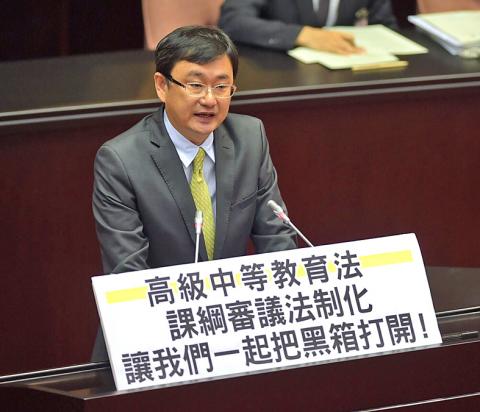The legislature yesterday passed amendments to the Senior High School Education Act (高級中等教育法) to overhaul the review process for the curriculum guidelines, which sparked protests against lack of transparency last year.
The amendments mandate that to improve accountability, the curriculum guidelines evaluation committee should be at the level of the Executive Yuan and its membership must include both governmental and nongovernmental representatives, including students’ representatives, who were not allowed a say previously.
Committee members affiliated with the government cannot exceed one-quarter of the total membership and nongovernmental committee members are to be selected through a process similar to that of the Taiwan Public Television Service Foundation’s board of directors.

Photo: Huang Yao-cheng, Taipei Times
The amended law authorizes education-related institutions, schools, legal personnel and groups to submit proposals for curriculum changes, in addition to permanently established governmental organizations dedicated to curriculum research and development.
Curriculum guideline research, development, evaluation and implementation must respect the guiding principles of ethnic pluralism, gender equality, transparency and political non-partisanship with regard to political parties, the amendment says.
In response to public criticism of the composition of curriculum guideline evaluation committees, the amended act is to limit government representatives in the curriculum guidelines committee to no more than one-quarter of its total of between 41 and 49 members.
Government representatives on the committee are to be nominated by the Ministry of Education from central and local government personnel and approved by the premier, the amendment says.
Nongovernmental committee members are to be nominated by the Executive Yuan and are to be accredited educational professionals, and are to include experts, academics, school principals, teachers and other education-related nongovernmental organizations, in addition to parents and students.
Nominations must be submitted to a panel appointed by the legislature for approval, the amendment says.
The panel will comprise of between 11 and 15 legislature-appointed objective and nongovernmental individuals, and is to approve the Executive Yuan’s nominee list (of the nongovernmental committee members) by a majority vote, it says.
A curriculum guideline evaluation committee member has a term of four years, with the possibility of serving consecutive terms, and each gender cannot have less representation than one-third of the committee.
Aborigines must be present in both the governmental and nongovernmental committee membership bodies, the amendment says.
To improve democracy on campus, the amendment also requires the presence of democratically elected student representatives or student association representatives on senior high school disciplinary committees.
Premier Simon Chang (張善政) responded to the amendment’s passage yesterday by saying that, while he understands that legislators want to emphasize the importance of the curriculum issue by elevating the evaluation committee to Executive Yuan level, he believes that “governmental responsibilities must be principally discharged by the relevant government agency.”
Chang said that he is concerned about the “available manpower” at the Executive Yuan and he would suggest that premier-designate Lin Chuan (林全) “reconsider” the passage of the amendment.

‘FORM OF PROTEST’: The German Institute Taipei said it was ‘shocked’ to see Nazi symbolism used in connection with political aims as it condemned the incident Sung Chien-liang (宋建樑), who led efforts to recall Democratic Progressive Party (DPP) Legislator Lee Kun-cheng (李坤城), was released on bail of NT$80,000 yesterday amid an outcry over a Nazi armband he wore to questioning the night before. Sung arrived at the New Taipei City District Prosecutors’ Office for questioning in a recall petition forgery case on Tuesday night wearing a red armband bearing a swastika, carrying a copy of Adolf Hitler’s Mein Kampf and giving a Nazi salute. Sung left the building at 1:15am without the armband and apparently covering the book with a coat. This is a serious international scandal and Chinese

A US Marine Corps regiment equipped with Naval Strike Missiles (NSM) is set to participate in the upcoming Balikatan 25 exercise in the Luzon Strait, marking the system’s first-ever deployment in the Philippines. US and Philippine officials have separately confirmed that the Navy Marine Expeditionary Ship Interdiction System (NMESIS) — the mobile launch platform for the Naval Strike Missile — would take part in the joint exercise. The missiles are being deployed to “a strategic first island chain chokepoint” in the waters between Taiwan proper and the Philippines, US-based Naval News reported. “The Luzon Strait and Bashi Channel represent a critical access

COUNTERINTELLIGENCE TRAINING: The ministry said 87.5 percent of the apprehended Chinese agents were reported by service members they tried to lure into becoming spies Taiwanese organized crime, illegal money lenders, temples and civic groups are complicit in Beijing’s infiltration of the armed forces, the Ministry of National Defense (MND) said in a report yesterday. Retired service members who had been turned to Beijing’s cause mainly relied on those channels to infiltrate the Taiwanese military, according to the report to be submitted to lawmakers ahead of tomorrow’s hearing on Chinese espionage in the military. Chinese intelligence typically used blackmail, Internet-based communications, bribery or debts to loan sharks to leverage active service personnel to do its bidding, it said. China’s main goals are to collect intelligence, and develop a

PERSONAL DATA: The implicated KMT members allegedly compiled their petitions by copying names from party lists without the consent of the people concerned Judicial authorities searched six locations yesterday and questioned six people, including one elderly Chinese Nationalist Party (KMT) member and five KMT Youth League associates, about alleged signature forgery and fraud relating to their recall efforts against two Democratic Progressive Party (DPP) legislators. After launching a probe into alleged signature forgery and related fraud in the KMT’s recall effort, prosecutors received a number of complaints, including about one petition that had 1,748 signatures of voters whose family members said they had already passed away, and also voters who said they did not approve the use of their name, Taipei Deputy Chief Prosecutor